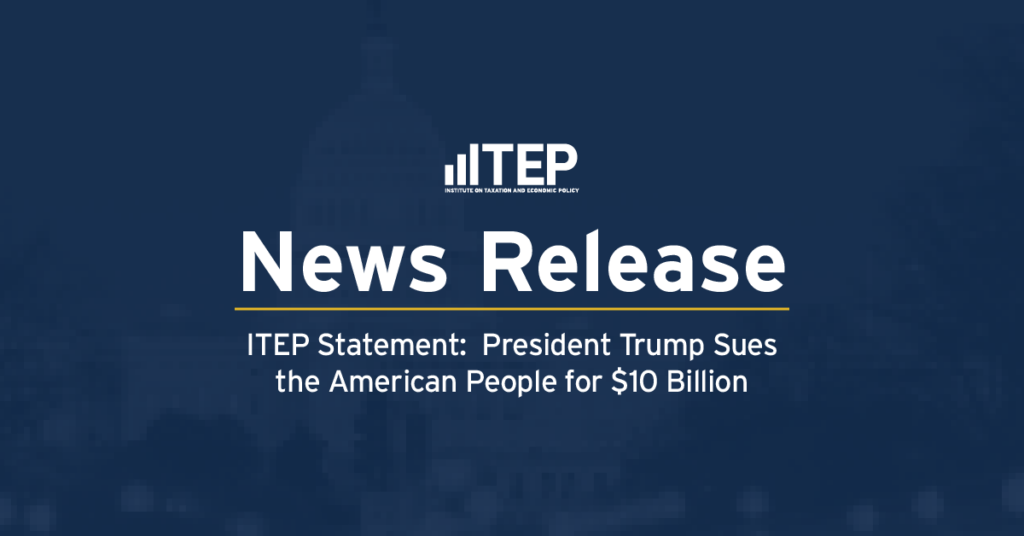Contact: Jon Whiten ([email protected])
Corporate tax cuts exacerbate economic and racial disparities, according to a new report from the Institute on Taxation and Economic Policy and Liberation in a Generation that is the first of its kind to analyze the distribution of these cuts across different racial and economic groups.
This collaborative report examines the racial and ethnic distribution of corporate tax breaks and avoidance, making clear these policies harm Americans as a whole but are especially harmful to Black and Hispanic families.
Some of the report’s key findings:
- Corporate tax breaks disproportionately benefit white households, who are 67% of the U.S. population but receive 88% of the benefits that remain in the U.S. Black and Hispanic households, representing 12% and 9% of the population, each only receive 1% of the benefits.
- When Congress cuts corporate taxes or allows corporations to avoid taxes, the richest 5% of U.S. residents receive most of the benefits of the benefits that remain in the country because they own who own most corporate stocks, while low- and middle-income households receive little, if any, benefits.
- Stark racial disparities in corporate stock ownership significantly contribute to the wealth gap between white and minority households, which would be significantly lower without these disparities.
- Because foreign investors own around 40% of American stocks, U.S. households receive only about 60 cents of every dollar in corporate tax reductions during the first year when a new corporate tax break is in effect.
“Many policymakers claim that cutting corporate taxes will boost wages and grow the economy for all,” said Jeremie Greer, Co-Founder and Co-Executive Director of Liberation in a Generation. “But our report suggests otherwise: corporate tax cuts mainly benefit white shareholders, foreign investors, and the wealthy elite, leaving families and workers of color with almost nothing. This perpetuates our current Oppression Economy and drives runaway corporate power that harms us all.”
The report explores the problems with the corporate tax cuts enacted as permanent provisions in the Trump tax law, which President Biden proposes to partly roll back while former President Donald Trump has suggested cutting even further. The looming expiration of other parts of that law at the end of 2025 is causing many lawmakers to question whether the corporate tax cuts should have been made permanent and whether they should be revisited, and the two main presidential contenders are already debating the issue on the campaign trail.
The new report also comes on the heels of a recent ITEP report that showed that while profits for the largest, continuously profitable U.S. corporations rose by 44% after passage of the Trump tax law, their federal tax bills dropped by 16%, amounting to $240 billion in tax breaks.
“Americans have told pollsters for years and years that they believe corporations should pay more, not less, in taxes, and the Trump tax law, with its huge corporate tax cut, was deeply unpopular,” said ITEP Federal Policy Director Steve Wamhoff. “This report provides the facts to back up what Americans feel intuitively – that corporate tax cuts are deeply unfair.”
The expiration of some parts of the Trump tax law next year presents an opportunity for Congress to reform our tax code and curb rising inequality and corporate power. Lawmakers should roll back the 2017 law’s corporate tax cuts and close loopholes that allow corporations to pay far less than their fair share. They should start by doing the following, among other reforms:
- Equalizing the taxation of domestic and foreign profits to begin ending offshore corporate tax avoidance
- Scaling back depreciation breaks by ending the full expensing of capital spending and other forms of permanent accelerated depreciation
- Curbing share buybacks that are used to boost stock values and enrich shareholders by increasing the stock buyback tax
- Eliminating the break for stock options that can lead to disproportionately large and unjust corporate deductions
- Cracking down on corporate tax avoidance by implementing a global corporate minimum tax




